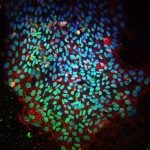Link to Pubmed [PMID] – 25456740
Cell Metab. 2014 Dec;20(6):1038-48
Precise control of the thyroid hormone (T3)-dependent transcriptional program is required by multiple cell systems, including muscle stem cells. Deciphering how this is achieved and how the T3 signal is controlled in stem cell niches is essentially unknown. We report that in response to proliferative stimuli such as acute skeletal muscle injury, type 3 deiodinase (D3), the thyroid hormone-inactivating enzyme, is induced in satellite cells where it reduces intracellular thyroid signaling. Satellite cell-specific genetic ablation of dio3 severely impairs skeletal muscle regeneration. This impairment is due to massive satellite cell apoptosis caused by exposure of activated satellite cells to the circulating TH. The execution of this proapoptotic program requires an intact FoxO3/MyoD axis, both genes positively regulated by intracellular TH. Thus, D3 is dynamically exploited in vivo to chronically attenuate TH signaling under basal conditions while also being available to acutely increase gene programs required for satellite cell lineage progression.

